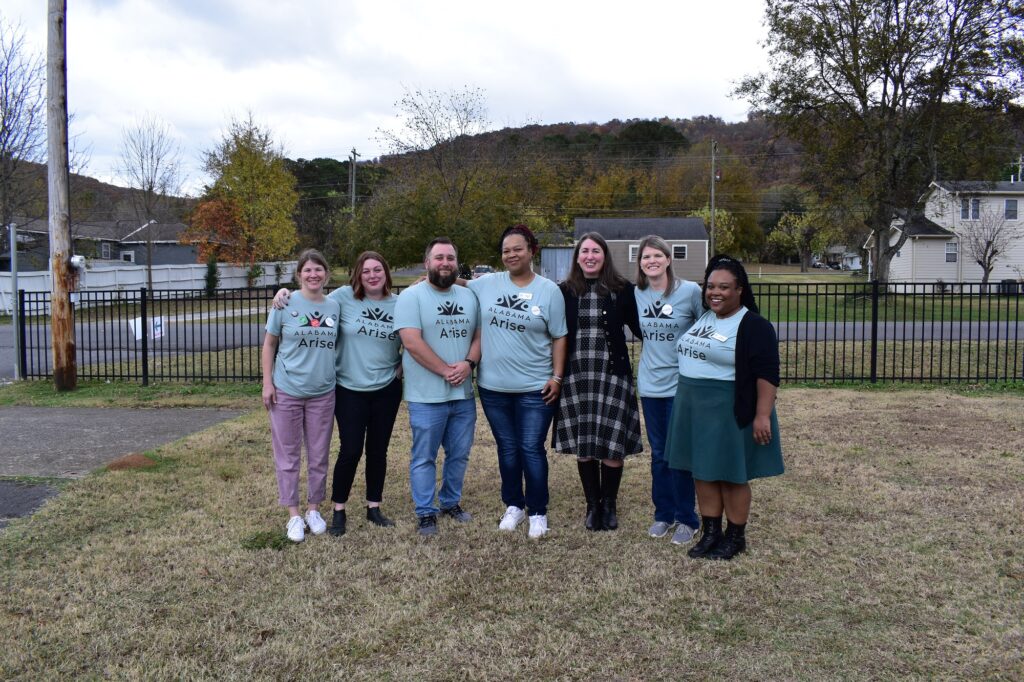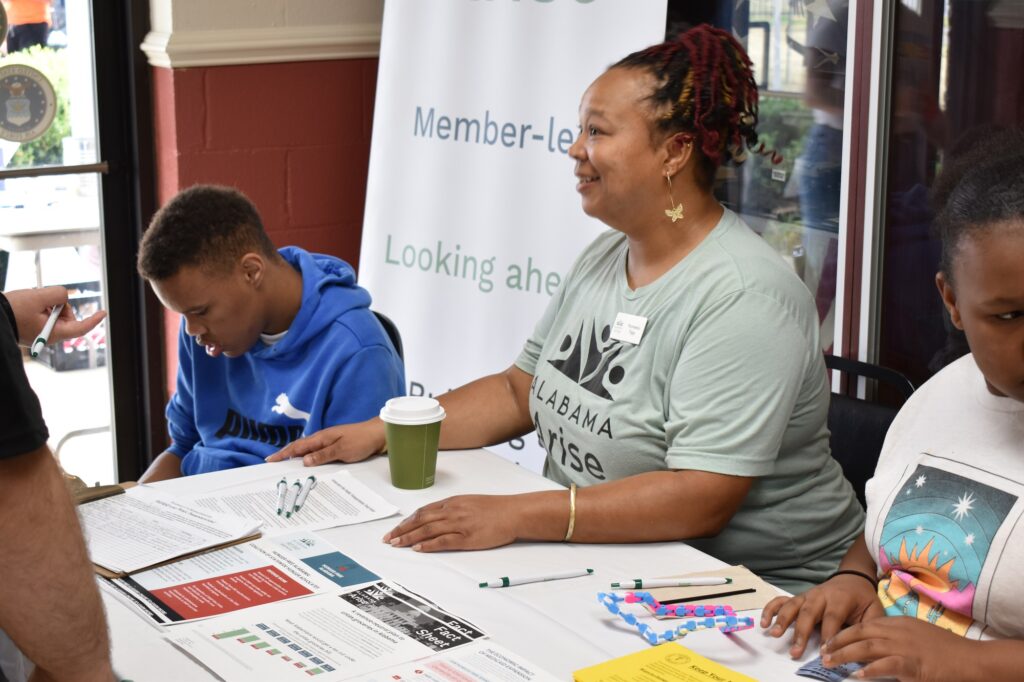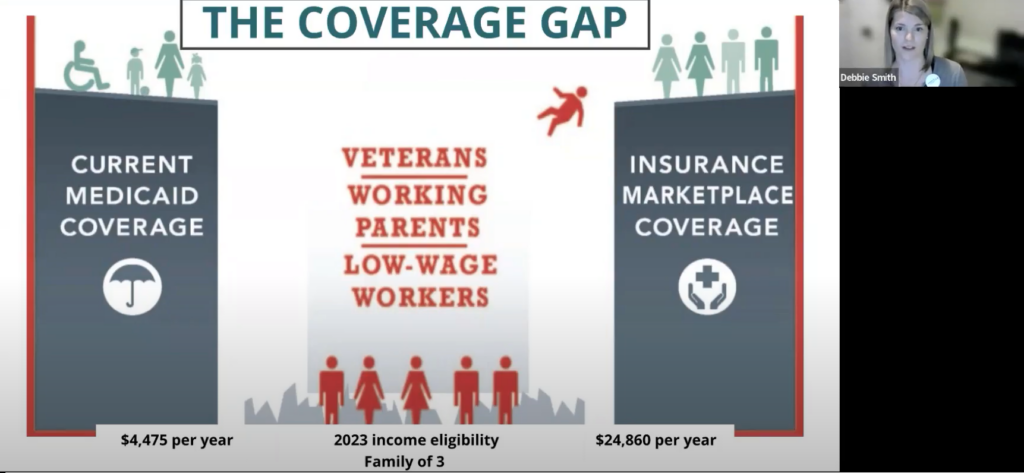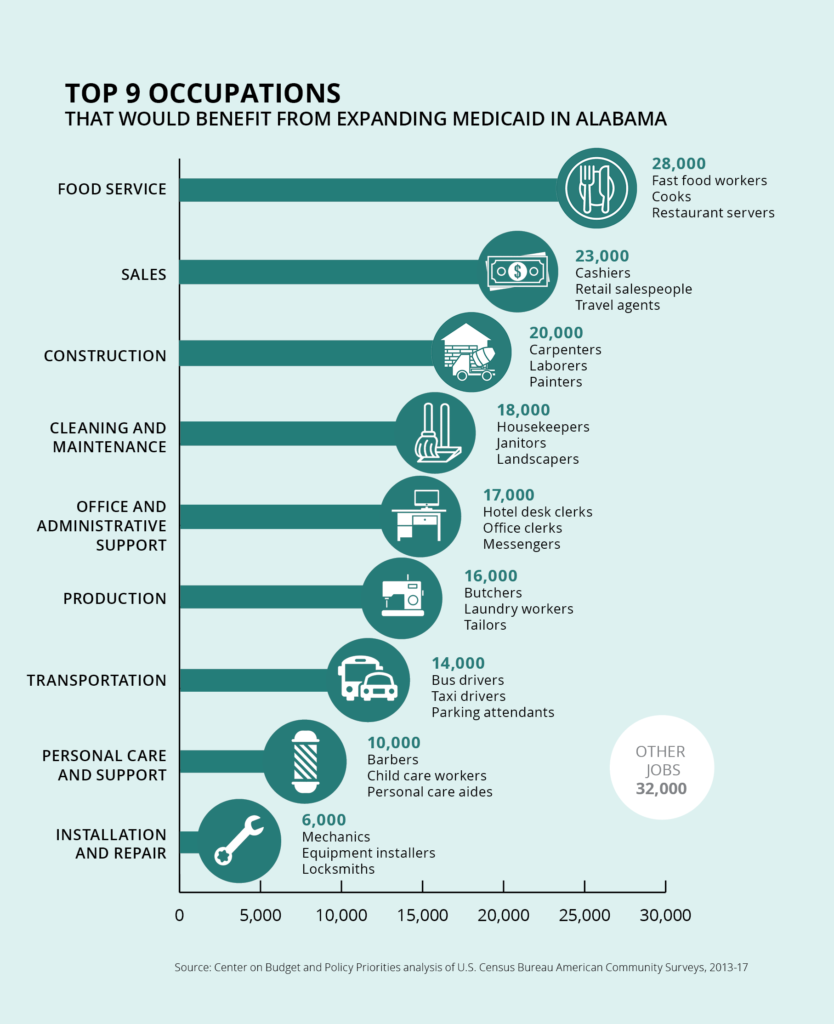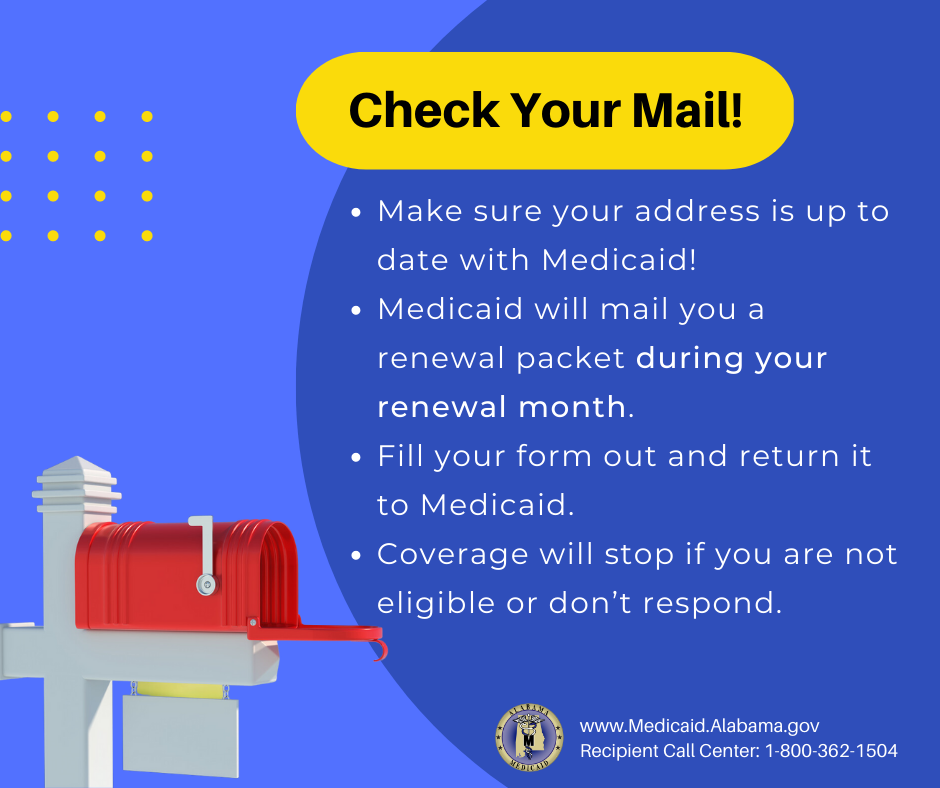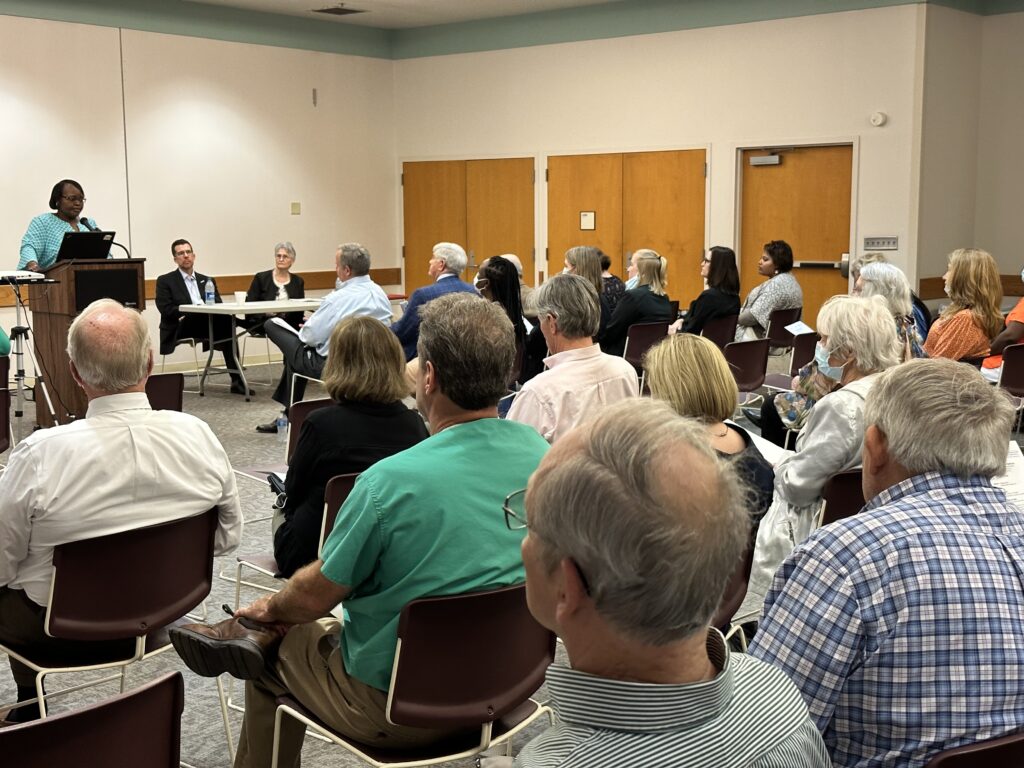
Fresh opportunities to push for a better Alabama
By Akiesha Anderson, policy and advocacy director
The Alabama Legislature will welcome 37 new lawmakers to its halls when its 2023 regular session begins March 7. Alabama Arise sees this as an opportunity to educate new legislators and identify new allies on issues of importance to our members. We urge folks to join us in calling for change, including at Arise Legislative Day on April 11.
Eliminate the state grocery tax
In early February, 11% of Alabama households said they sometimes or often didn’t have enough food to eat. And those hunger challenges are even more severe in communities of color. More than 23% of Black Alabamians and 13.6% of Hispanic Alabamians said they sometimes or often didn’t have enough food.
Untaxing groceries would help families across Alabama keep food on the table. As we have for more than two decades, Arise once again will support bills this year to remove the state’s 4% sales tax on groceries. We also will support replacing the grocery tax revenue by limiting or ending a tax loophole for the wealthiest households. This legislation by Sen. Andrew Jones, R-Centre, and Rep. Penni McClammy, D-Montgomery, would empower Alabama to untax groceries while protecting funding for public schools.
Expand Medicaid to close the health coverage gap
For nearly a decade, Alabama has been outside looking in on a good deal. While hundreds of thousands of Alabamians continue to struggle without health insurance, state leaders have failed to expand Medicaid. Alabama is one of just 11 states that has yet to expand Medicaid. And that inaction has left more than 220,000 Alabamians in a health coverage gap.
Fifteen rural hospitals in Alabama are at imminent risk of closing this year if state leaders don’t act soon to protect health care access. Gov. Kay Ivey should act swiftly to expand Medicaid herself, but the Legislature’s support also will be vital. Arise will keep working to educate lawmakers and the public on the economic, budgetary and humanitarian benefits of Medicaid expansion.
Take bold steps to reform our criminal justice system
Legislators have an opportunity and an obligation to make strides in solving the many problems within Alabama’s criminal justice system. This issue has added urgency as Alabama faces a U.S. Department of Justice lawsuit alleging unconstitutional prison conditions.
Many avenues for progress exist. Arise will urge lawmakers to end the practice of suspending driver’s licenses for debt-based reasons. We will advocate for reform of the state “three-strikes” law, known as the Habitual Felony Offender Act. And we will support a bill to require the jury to be unanimous before imposing the death penalty.
Address housing and transportation needs
State House insiders expect the Legislature to go into a special session this spring to decide how to use remaining federal funds under the American Rescue Plan Act (ARPA). From the start, Arise has taken the position that Alabama should use some of its ARPA funds to jump-start public transportation and help thousands find an affordable place to call home. During the probable special session, we will continue to uplift the need for these investments in the people of Alabama. Click here to learn more.
Arise Legislative Day is Tuesday, April 11!
Your voice matters! Make plans now to speak up with us for a better Alabama for all.
Join us at Arise’s 2023 Legislative Day on Tuesday, April 11, at the RSA Plaza in Montgomery.
Legislative Day is an annual opportunity for Arise supporters to meet their lawmakers and make the case for policy changes to improve life for everyday Alabamians. We expect this year’s advocacy to focus on expanding Medicaid, untaxing groceries and funding public transit.
Registration will begin at 9:30 a.m. on the sixth floor of the RSA Plaza Building. The event will begin at 10 a.m. with an issue briefing and lunch at the RSA Plaza, followed by a news conference at 12:15 p.m. on the steps of the Alabama State House. Then we will visit with lawmakers before returning to the RSA Plaza at 2:30 p.m. for a membership meeting.
Click here to register. Please register by April 3 as seating is limited. There is no cost to register, but a $15 donation for lunch is suggested.
Please note: Health and safety precautions will be observed. Attendees are asked to wear a mask during the event.
We look forward to seeing you!
Budget priorities for the people
By Robyn Hyden, executive director
Two weeks before the Alabama Legislature’s 2023 regular session, lawmakers, lobbyists and advocates packed into the State House in late February for the annual joint legislative budget hearings. One might call it the Super Bowl for budget nerds.
After years of scarcity, both Alabama budgets are starting out with a revenue surplus. There’s $351 million in “excess” revenue for the General Fund, and $2.7 billion for the Education Trust Fund. That’s not even counting the remaining $1.1 billion in American Rescue Plan Act (ARPA) funds still awaiting allocation.
What we heard at this year’s budget hearings was not surprising. Public services like education, health care, mental health and supportive services need more resources after years of underinvestment. State agencies are struggling with worker shortages and the consequences of underfunding – and understaffing – critical programs. It’s no surprise that lawmakers heard a long, detailed list of opportunities to meet these needs. Most agency heads were clear that new funding can’t fix all of the problems – but it’s a start.
Some lawmakers have floated the idea that this one-time surplus is a sign we need a tax rebate. If that proposal materializes, Arise will be front and center advocating for funds to go directly to low- and moderate-income households bearing the brunt of higher costs. But Arise’s proposal, which comes directly from listening to our members, is a longer-term solution to our upside-down tax code. Our bill to untax groceries would help families keep food on the table while also protecting funding for public schools. It’s a solution that goes beyond just one year to create more foundational and sustainable change.
One concern you may have heard is that nobody has enough workers. Too many Alabamians are still disconnected from the workforce due to missing critical infrastructure investments in child care, public transportation, health care and affordable housing. This year, we’ll be pushing for investments in these supports to help people get and keep work, and to build the healthy and educated workforce Alabama needs.
Our 2023 policy proposals provide that roadmap for change. Expand Medicaid to ensure nobody has to die for lack of preventive care or live in poverty because they have a chronic health condition. Invest in infrastructure to support workers, including child care, housing, public transportation and education. Stop funding public services with punitive fines and fees, and start ensuring the wealthiest Alabamians pay their fair share.
We look forward to seeing you all at our Legislative Day this April. If we continue to stand and work together, we will make significant progress for Alabama.
The workforce benefits of Medicaid expansion
By Mike Nicholson, policy analyst
For nearly a decade, Alabama has been outside looking in on a good deal. While hundreds of thousands of Alabamians struggle without health insurance, state leaders have failed to expand Medicaid to cover adults with low incomes. A few loud voices have politicized an issue that shouldn’t be political. And our state has paid the price in lost dollars, lost jobs and lost lives.
Reliable access to health care keeps people healthier and empowers them to work. That’s one reason 39 states and the District of Columbia have embraced Medicaid expansion. Alabama is one of 11 states that has yet to expand Medicaid. That inaction has left more than 220,000 Alabamians in a health coverage gap. Parents in a family of three making more than $4,475 a year don’t qualify for Alabama Medicaid. But unless they make at least $24,860 a year, they also don’t qualify for Marketplace subsidies under the Affordable Care Act. Adults without children or a disability are ineligible for Alabama Medicaid, no matter how low their incomes.
It’s time to end this injustice and close the coverage gap. Medicaid expansion is the single best solution available for lawmakers to make Alabama healthier. And it is one of the best solutions to help cure our state’s workforce woes.
Medicaid expansion would help Alabamians stay employed
Alabama’s labor force participation rate is lower than that of neighboring states. Fortunately, Medicaid expansion is a proven, pro-work policy. States that have expanded Medicaid have seen a greater increase in labor force participation among people with disabilities and among people with incomes below 138% of the poverty line than non-expansion states. These are the very people Medicaid expansion would benefit most.
It’s impossible to separate health care policy from workforce policy, because health care policy is workforce policy. Why would a family move to Alabama for job opportunities instead of a state that invests more in workers’ health? And how long will businesses keep relocating to Alabama if our workforce isn’t healthy enough to fill vacancies?
Alabamians work hard every day to provide for themselves and their families. But hundreds of thousands aren’t paid enough to afford health coverage. Fast food workers, cashiers, carpenters and hotel clerks are among the many folks who work hard at low-paying but essential jobs that often don’t provide health insurance. They are among the Alabamians who would benefit most from Medicaid expansion.
End of emergency SNAP allotments will increase hunger in Alabama
By Carol Gundlach, senior policy analyst
Temporary increases to Supplemental Nutrition Assistance Program (SNAP) benefits helped ease suffering for families across Alabama and nationwide. But those boosts expired in February. SNAP participants now face a benefit decrease that will cut their food assistance significantly.
Nearly 400,000 Alabama households will see average cuts to their SNAP benefits of around $170 a month. Particularly hard hit will be older adults and people with disabilities who live alone. Before the pandemic, SNAP benefits for these households were often minimal and could be as low as $16 per month. Emergency allotments boosted these folks’ benefits to the maximum of $281 per month for an individual. But with these increases ending, these participants will see their food budgets decline, possibly to as little as the current minimum of $23 per month.
The loss of SNAP emergency allotments almost certainly will increase hunger, both in Alabama and nationwide. But individuals have a few options to help reduce the pain:
- SNAP benefits don’t have to be spent in the month in which they are received. Emergency SNAP allotments will roll over on Electronic Benefits Transfer (EBT) cards as long as the card is used at least once a month. This will allow participants to stretch their emergency dollars as far as possible.
- Older adults or people with disabilities are eligible to deduct medical costs, including transportation to the doctor or pharmacy, before calculating SNAP benefits. Updating medical costs may result in more assistance than people are receiving.
- All households participating in SNAP can deduct the cost of housing and dependent care. Updating housing costs and the cost of child care or care for adults with disabilities could increase SNAP benefits.
- Some grocery stores and farmers markets offer extra fruits and vegetables for SNAP participants. Find out where you can get these Double Up Food Bucks.
What policymakers can do to help
Hunger is a systemic problem that requires systemic solutions. Federal, state and local officials all have roles to play in helping to reduce hunger in Alabama and the nation. Below are a few of the many policy options available.
Untax groceries: Alabama is one of only three states with no tax break on groceries. Removing the state sales tax from food would allow everyone to afford an extra two weeks’ worth of groceries.
Expand free school meals: Many local schools and districts provide free school meals for all their students. Universal free meals improve students’ health and education. They also reduce the financial burden on families struggling to make ends meet.
Provide state funding for Double Up Food Bucks: The Double Up Food Bucks program offers extra fruit and vegetables for SNAP participants. This program promotes better health for SNAP participants and more money for Alabama’s farmers. But the absence of state dollars limits the number of stores where these extra benefits are available.
Strengthen SNAP in the Farm Bill: Congress must reauthorize the Farm Bill, which includes SNAP, next year. Many advocates are calling for Congress to make the emergency allotment amounts permanent, either in the Farm Bill or through other legislation.
How Alabama can protect health coverage during the Medicaid ‘unwinding’ period
By Jennifer Harris, health policy advocate
As the end of the COVID-19 public health emergency (PHE) approaches, tens of thousands of Alabamians will start paying more for critical medical care – or simply be unable to afford it – unless our state lawmakers take action. About 61,000 Alabamians are expected to lose Medicaid coverage by June 2024 due to this change, according to the Robert Wood Johnson Foundation and Urban Institute. These coverage losses would leave many Alabamians with no realistic option for affordable coverage because our state still has not expanded Medicaid to cover adults with low incomes.
Medicaid expansion is the single best step Alabama could take to preserve health coverage and reduce costs for people who cannot afford a private plan and otherwise would be uninsured. In the meantime, state officials should be proactive in communicating with enrollees and facilitating transitions to Marketplace coverage where possible.
Medicaid received additional federal funding to keep current and new enrollees eligible until the PHE’s end. Under this maintenance of effort (MOE) requirement, traditional eligibility criteria were relaxed.
The relaxed criteria led to continuous coverage eligibility. That meant Medicaid enrollees would not lose eligibility unless they requested in writing to be removed, moved out of state or died. It also meant changes in income or family size no longer caused removal from Medicaid during the PHE.
But with the MOE requirement about to end, Alabama Medicaid will begin reviewing people for eligibility again starting April 1. This return to normal rules is called “unwinding.” State officials say they will take one year to complete the unwinding process.
Take action to maintain coverage
The Alabama Unwinding Task Force, which Alabama Arise chairs, is working with Medicaid to support outreach and communication efforts. This task force is ensuring support is available for current eligible enrollees to maintain their coverage. It also is working to ensure people who no longer meet Alabama Medicaid’s eligibility criteria know their available coverage options. To get involved with the task force, email me at jennifer@alarise.org.
Individuals who remain eligible for Medicaid could be at risk of losing coverage during unwinding due to administrative barriers. To ensure they maintain coverage, eligible enrollees first should verify their current contact information. They also can sign up online to receive text messages from Medicaid with vital information.
If an enrollee is no longer eligible for coverage through Alabama Medicaid, they should contact Enroll Alabama to discuss options that may be available on the Health Insurance Marketplace. They also can dial 211 to connect with an Enroll Alabama navigator who can assist in finding coverage.
See the Gap: How Medicaid expansion would help hairstylists and barbers

Hairstylists and barbers often work six or seven days a week, with little fanfare and long hours on their feet. But most don’t get health insurance through their employers. And those who are self-employed often don’t make enough to afford private coverage.
In her “See the Gap” series, Alabama Arise storyteller Whit Sides spotlights a few of the thousands of Alabama personal care professionals who would benefit from Medicaid expansion. Click here to read this ongoing series.
A membership base that looks like Alabama
By Jacob Smith, development director
At Alabama Arise, people are our power. As a member, you are part of a network that drives our shared vision of a state where all people have resources to reach their potential. Collectively, you vote on our policy priorities, stay informed through our Daily News Digest and legislative updates, and advocate for fair public policies.
Because members like you are important to our mission, we work to diversify and expand our membership. We want to be reflective of Alabama and representative of people living paycheck to paycheck.
We have set long-term goals to recruit more members of color, members under age 30, and members with low incomes. And we’ve been making progress. In 2022, we grew our BIPOC membership to 17% and our membership of young adults to 3%. Through our gift membership program, we grew our membership of people with low incomes to 23%.
This data only reflects members who completed our survey. For Arise to be successful, it is critical that we understand more about you and your values. If you haven’t already, will you complete our survey? It can be found by visiting this link.
No matter your identity or background, completing this survey will help us understand the change you want to see in Alabama.
Welcome, Akiesha!
Akiesha Anderson joined Arise as our new policy and advocacy director in November 2022. In this role, she leads a team of policy advocates and analysts committed to improving the lives of Alabamians who are marginalized by poverty.
Akiesha has more than a decade of experience working in the public sector and nonprofit realms and striving to make society more equitable for marginalized groups. Akiesha grew up in Montgomery and is a graduate of Alabama State University, Auburn University at Montgomery and the University of Alabama School of Law. She has a bachelor’s degree in sociology with a minor in business management; a master’s degree in public administration; and a law degree with a certificate in governmental affairs.
OTHER STAFF MOVES
Arise also recently had two other staff changes. Debbie Smith is now the Cover Alabama campaign director after serving as a northeast Alabama organizer since 2018. And Celida Soto Garcia is leaving Arise after working as a hunger policy advocate since 2019. We thank Celida for her great work and wish her well!
Online and off: Arise advocates all over!
Alabama Arise is providing a mix of in-person and virtual meetings to help keep advocacy accessible to all.
